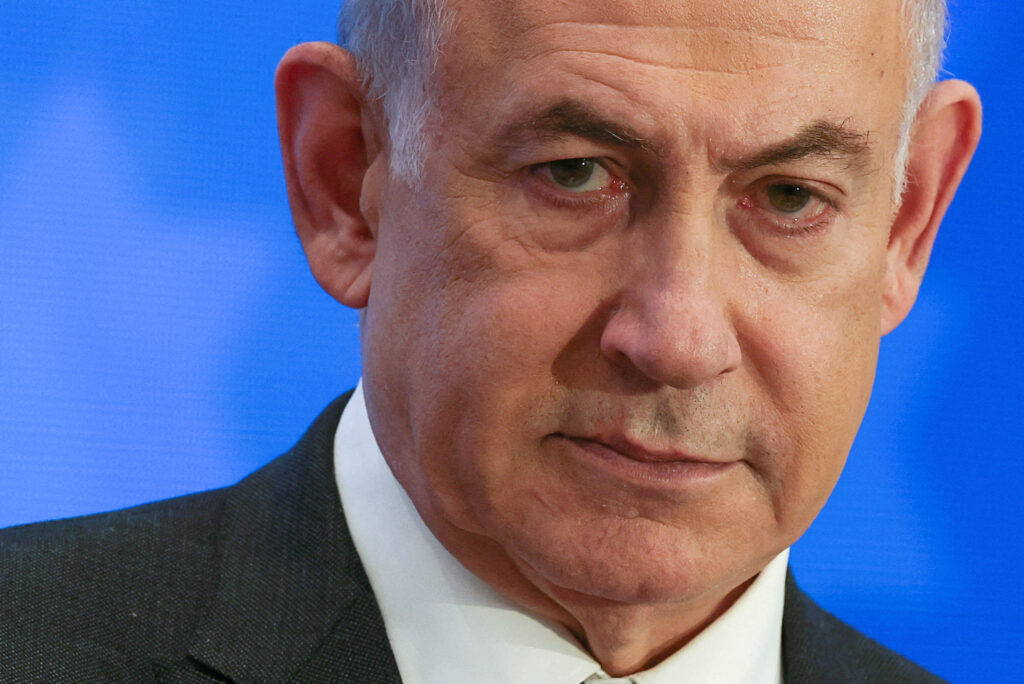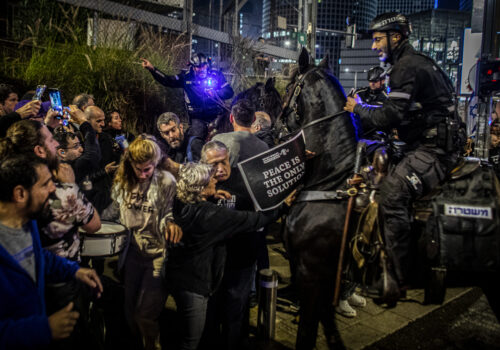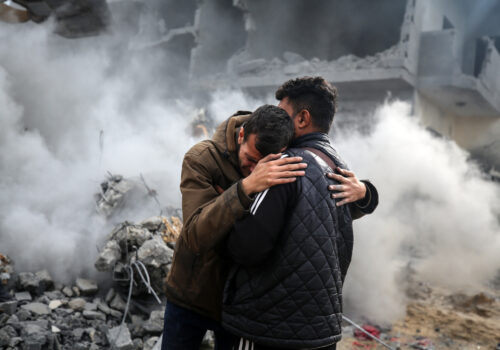The international community and many Israelis have come to the conclusion that Israeli Prime Minister Benjamin Netanyahu is determined to remain in power.
No matter what.
No matter that his attempts to undermine the independence of the judiciary brought demonstrators out night after night to try to protect Israel’s democracy, and undermined military order as soldiers threatened to boycott duty in protest.
No matter that under his leadership the state of Israel failed its most basic responsibility on October 7, 2023: to protect its citizens.
In response to that attack, the prime minister promised “vengeance” and laid out three priorities:
- Crush Hamas.
- Bring the hostages home.
- Ensure no terrorism can be launched from Gaza in the future.
Many observers view these priorities as nearly impossible to achieve through the methods he has used so far to conduct this war. But his methods help ensure his longevity if elections remain delayed until the war is “won.”
The prime minister said from the start that the war would take months. Nearly six months of steady bombing and destruction in the Gaza Strip has had unimaginable results: Many Americans are now questioning whether the war constitutes a genocide and are certain of the use of collective punishment, as US public opinion turns against Israel’s conduct.
One definition of vengeance is “a downward spiral of pain and betrayal.”
It is clear to many Americans and others around the world that even if the Israel Defense Forces (IDF) kill every current member of Hamas, at least some of the family members of the reported 32,000 (and counting) Palestinians killed will hold a desire for revenge in their hearts. Corrupt ideas, like those that launch terrorist attacks, and worthy ideas, like those that lead to demands for freedom and independence, do not die because people are killed.
Netanyahu’s second goal, to bring all the hostages home, must be questioned as well. The record shows that of the more than one hundred hostages who have been released from Hamas’s terrible hands, only two were rescued by the IDF. This number is fewer than the three the IDF killed as they tried to escape. Diplomacy, not bombing, has been the more effective way to end the misery of the captives and their families—Israeli, American, and other nationalities alike. Netanyahu, who oversaw the diplomacy that brought so many hostages home, of all people should understand this.
Days after the October 7 attack, US President Joe Biden advised Israel not to be “blinded by rage” and make the same “mistakes” the United States did after 9/11. He also offered “rock solid” support for whatever Netanyahu deemed necessary to get the hostages back and secure the nation. In spite of this wise counsel, Israel’s response to Hamas’s heinous attack has too often been focused on vengeance and a willingness to step back from democratic norms and the rules of war, to wallow in “Hama rules,” as Syria’s leaders did to put down a 1982 uprising.
No matter that Netanyahu has led Israel to endanger its relationship with the United States and damage Israel’s standing among many Americans by dismissing and expressing disrespect, disdain, and disregard for the views of his nation’s greatest ally. Repeating his behavior with earlier US presidents, the prime minister has made it clear that he is willing and capable of embarrassing the president of the United States. And there are signs that Biden is reaching his breaking point. In a tense phone call on Thursday, Biden indicated to Netanyahu that future US support would be contingent on Israel changing course, leading Israel to open up more aid routes into Gaza. The prime minister’s conduct of the war and handling of the US-Israel bilateral relationship have hurt Biden’s domestic standing and the United States’ international reputation, though both are retrievable.
Israel has taken less than a year to go from being a nation widely admired by Americans to evoking dismay among an increasing share of the population. This is a result of Israel’s embrace of collective punishment, its willingness to use starvation as a weapon of war, and its willingness to inflict terrible casualties among innocent civilians—Gaza residents, journalists, health workers, and aid providers—in an attempt to stamp out terrorism.
It was impossible to imagine such a major overreach in the immediate aftermath of the attack. Much of the world was horrified and came to the conclusion that there must be a clear alternative to terrorism to ensure that Israelis could have the safety, security, and sustainable peace that they, along with Palestinians, deserve.
The prime minister disagrees.
Along with the casualties in Gaza and the land grabs and attacks on Palestinians in the West Bank (at least two hundred have been killed since October 7), Israeli strikes this week in Syria have heightened the danger of escalation in the region and beyond. Domestic pressure is growing against the leaders of regional states that are conducting diplomatic relations with Israel. A recent survey found that American Jews feel less secure. Americans are fighting with each other over a foreign conflict.
Hamas opened the floodgates of hell onto Gazans, and Hamas must be held to account. That can’t begin where it needs to happen—among Palestinians, affirmatively rejecting Hamas’s leadership—until the war stops. And then the accounting for the rest of us also begins, when we actually see what happened in the Gaza Strip, what the Israelis were willing to do. The killing of Western aid workers from World Central Kitchen this week has opened our eyes a little wider to the dangers of this conflict. Both Iran and the United States have had to disavow knowledge or approval of allies’ actions to each other, in an effort to avoid a big war.
As long as Israel’s leadership continues along this path, the downward spiral will only continue, with no bottom in sight.
Ambassador Gina Abercrombie-Winstanley is a nonresident senior fellow at the Scowcroft Middle East Security Initiative of the Atlantic Council’s Middle East Programs and at the Scowcroft Center for Strategy and Security. Abercrombie-Winstanley served as the US ambassador to the Republic of Malta and as special assistant for the Middle East and Africa to the secretary of state. Her Middle East assignments included election monitoring in the Gaza Strip and an assignment where she supported gender equality in the Kingdom of Saudi Arabia as the first woman to lead a diplomatic mission there.
Further reading
Wed, Apr 3, 2024
Jordan was already walking a tightrope. Then the Gaza war happened.
MENASource By
Around six months into the war, many Jordanians have not been satisfied with their government’s response to the Gaza war.
Wed, Mar 6, 2024
Netanyahu might be losing ground, but his politics still resonate with most Israelis
MENASource By Ksenia Svetlova
Polls show that the Israeli public is torn on many issues, but trust in Netanyahu’s government is not one of them.
Mon, Mar 4, 2024
The lost humanity of the crisis in Gaza
New Atlanticist By Jonathan Panikoff
Supporters of Israel and of the Palestinians should work to acknowledge the pain, fear, and legitimate moral convictions of those with whom they so vehemently disagree.
Image: Israeli Prime Minister Benjamin Netanyahu addresses the Conference of Presidents of Major American Jewish Organizations, amid the ongoing conflict between Israel and the Palestinian Islamist group Hamas, in Jerusalem, February 18, 2024. REUTERS/Ronen Zvulun/File Photo/File Photo



